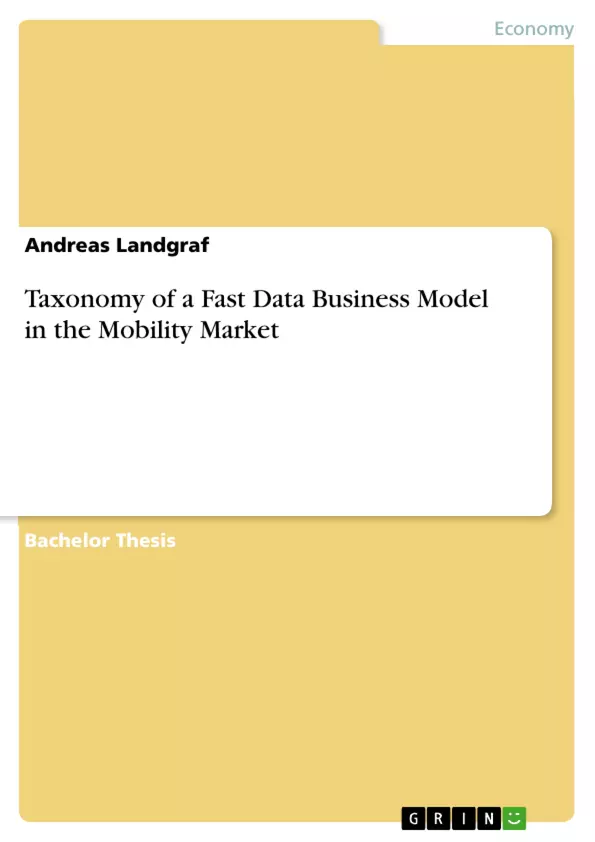Today, the market around mobility is under heavy change. The industry is preparing the change from fossil fuels to their alternatives. Large funds are raised to build new products based on electricity, either with rechargeable battery packs or solar energy. Another field of research and development is autonomous driving. Google and Tesla are prominent examples of companies developing technologies and prototypes of future autonomous cars. The information technology used in such cars is using data analysis and artificial intelligence to observe, measure, predict and control traffic situations. This technology is influenced by one of the trending technologies of the early 21th century, Big Data.
The basic research in data analysis had its crucial test in many Big Data related projects and products, like Facebook and Twitter. A part of the data analysis process are classification algorithms used to classify the input data for targeted further processing. Decision trees are one of the algorithms of classification. They are very precisely, but tend to overflow. This thesis will introduce the taxonomy of a business model, related to Open Innovation, for developing a new decision tree algorithm for the mobility market. Therefore, the data analysis process up to classification algorithms are introduced. The major decision tree algorithms are discussed in detail to build up the characteristics of the new decision tree algorithm.
Furthermore, the Open Innovation model is introduced to carve out the assets and drawbacks of this model. Based on that theoretical information, the taxonomy of a preliminary business model is developed and visualized using the business model canvas. To prove this concept, expert interviews and questionnaires were used to gather feedback and new ideas. The collected information is used to modify the taxonomy of the business model. The resulting business model canvas shows the possibility of implementation.
Inhaltsverzeichnis (Table of Contents)
- Introduction
- Problem Statement
- Motivation
- Background
- Methodology
- Scope and Outline of this Thesis
- From Big to Fast Data
- Defining Big Data
- Big Data Related Challenges
- Fast Data
- Decision Tree Algorithms
- A Short Introduction to Decision Trees
- Classification Trees
- ID3
- C4.5
- CART
- Decision Trees and Fast Data
- Hoeffding Tree
- VFDT
- CVFDT
- UCVFDT
- Preliminary Business Model
- Brief Introduction to Open Innovation
- Step-By-Step to the Business Model Concept
- Explorative Research
- Case Studies
- Expert Interviews
- Interview - Oskar Dohrau
- Interview - Jürgen Götzenauer
- Descriptive Research
- Business Model Adaption
Zielsetzung und Themenschwerpunkte (Objectives and Key Themes)
This bachelor thesis aims to develop a taxonomy of a business model for developing a new decision tree algorithm for the mobility market. It explores the application of Open Innovation within this business model concept.
- Data analysis processes for decision tree algorithms
- Fast data and its application in the mobility market
- Open Innovation model and its potential in the automotive industry
- Business model canvas for a decision tree algorithm development project
- Explorative research methodologies using case studies and expert interviews
Zusammenfassung der Kapitel (Chapter Summaries)
The thesis begins with an introduction to the problem statement, motivation, background, and methodology used. It then delves into the concept of Big and Fast Data, explaining its significance and challenges in the context of the mobility market. Chapter 3 focuses on decision tree algorithms, providing an overview of various classification trees and their application in fast data environments. The preliminary business model is discussed in Chapter 4, introducing the principles of Open Innovation and outlining the step-by-step development of the model concept. Explorative research methods, including case studies and expert interviews, are explored in Chapter 5. The thesis concludes with a detailed explanation of the business model adaption, which incorporates insights from the research conducted.
Schlüsselwörter (Keywords)
The thesis focuses on the following key concepts: decision tree algorithms, Open Innovation, business model canvas, fast data, serious gaming, and automotive industry. It utilizes these key concepts to explore the potential of a business model for developing a new decision tree algorithm for the mobility market.
Frequently Asked Questions
What is "Fast Data" in the mobility market?
Fast Data refers to the real-time processing of data, essential for autonomous driving and traffic control situations.
How are Decision Trees used in autonomous cars?
They are classification algorithms used to observe, predict, and control traffic situations based on artificial intelligence.
What is the role of Open Innovation in this business model?
Open Innovation allows companies to collaborate externally to develop new algorithms, sharing both assets and risks.
What is the Hoeffding Tree?
It is a specific type of decision tree algorithm designed for high-speed data streams (Fast Data).
What tool is used to visualize the business model?
The thesis uses the Business Model Canvas to develop and visualize the preliminary business model taxonomy.
- Quote paper
- Andreas Landgraf (Author), 2016, Taxonomy of a Fast Data Business Model in the Mobility Market, Munich, GRIN Verlag, https://www.grin.com/document/541425



